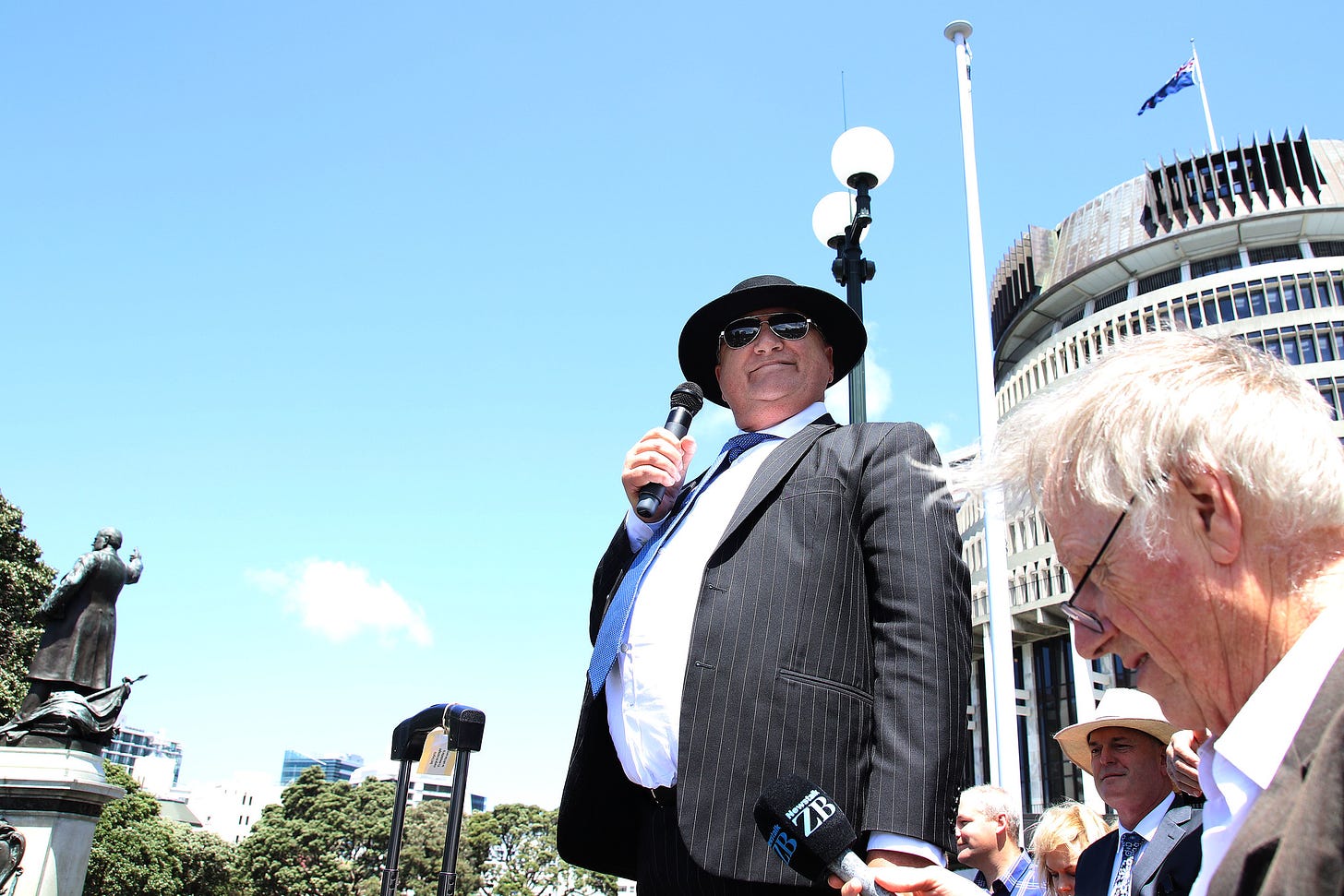
TL;DR: Here’s the top six news items of note in climate news for Aotearoa-NZ this week, and a discussion above between Bernard Hickey and The Kākā’s climate correspondent Cathrine Dyer:
This week, the coalition Government announced moves to ensure Agriculture does not enter the Emissions Trading Scheme (ETS) next year.
Instead, they will launch a new industry consultation process, run entirely by pastoral sector participants who will recommend what, if any, contribution the sector should make to reducing Aotearoa’s greenhouse gas (GHG) emissions.
The former Chief Science Advisor to the Ministry for Transport claimed that the government was “not even pretending to try” as the number of things he was asked to comment on ‘declined dramatically in the past six months”.
Meantime, Resources Minister Shane Jones threatened to lock-in offshore oil exploration and mining by calling for long-term contracts that would prevent any future government from reversing licenses for decades to come.
Last month, Prime Minister Christopher Luxon committed to emissions budgets out to 2030, making them one of nine Cabinet-approved government targets. The current plan is to make up for any domestic emissions shortfall by purchasing international offsets.
However, Treasury is still failing to account for the cost of these ‘constructive obligations’ in the Government’s financial statements. This situation allows a substantial obligation on taxpayers to grow in the dark, while climate policy that might have reduced it is being axed in broad daylight. Worse, the purely temporary savings that come from axing climate policies are being counted... toward the budget needed for tax cuts.
(See more detail and analysis below, and in the video and podcast above. Cathrine Dyer’s journalism on climate and the environment is available free to all paying and non-paying subscribers to The Kākā and the public. It is made possible by subscribers signing up to the paid tier to ensure this sort of public interest journalism is fully available in public to read, listen to and share. Cathrine wrote the wrap. Bernard edited it. Lynn copy-edited and illustrated it.)
1. A win for farmers backed by a clichéd narrative
The big climate news in Aotearoa this week is the Government’s announcement that they will be introducing new legislation this month to ensure that agricultural emissions (including the on-farm emissions of agriculture, animal processors and fertiliser companies) are not priced in the ETS in 2025.
Instead, the government will disband the latest consultation process, He Waka Eke Noa, and launch a new consultation process - one run entirely by pastoral sector participants, to consider approaches to tackling biogenic methane emissions. In other words, the sector itself will be invited (again) to consider what, if any, contribution they would like to make to reducing emissions.
According to Agriculture Minister Todd McClay, “New Zealand farmers are some of the world’s most carbon-efficient food producers” and “It doesn’t make sense to send jobs and production overseas, while less carbon-efficient countries produce the food the world needs”.
This assumes that the ‘food the world needs’ is KitKat bars and other packaged food items industrially produced in Chinese factories using the milk solid ingredients which are the primary agricultural export of New Zealand farmers. To be fair, nobody can say exactly what food products those milk solid exports end up in, because milk powder is sold at auction as a bulk commodity item whose ultimate destination is not tracked. However, it is quite likely that farmers’ commodity dairy exports contribute more to the world’s obesity problem than they do to the world’s food insecurity solution.
The narrative of ‘world’s most efficient producer’ is also arguable according to Dr Sebastian Gehricke, Director, Climate and Energy Finance Group and Senior Lecturer at University of Otago, Ōtākou Whakaihu Waka,
“I have heard the referral to New Zealand farms being the most carbon emission efficient in the world many times. First question one should ask to understand this is, where do those numbers come from? Who funded the research? And if you look at the limitations of the research, would we draw the same conclusions? Even if we are ‘some of the most carbon-efficient’ we are still emitting huge amounts of greenhouse gases as a country.”
Furthermore, Dr Gehricke adds,
“If the government wants to avoid farms being ‘shutdown’ a more effective mechanism may be removing exotic forests from the ETS.”
The ACT party welcomed the announcement, with ACT Rural Communities spokesman Mark Cameron claiming that “"under Labour and the Greens, farmers were being lined up as a sacrifice to the climate gods".
A rational and balanced treatment of the agricultural sector would base decisions on both its contribution to the economy and rural livelihoods, as well as what it extracts from the economy, society and environment as a result of its contribution to water and air pollution. Previous studies have suggested that this balance may be net negative for the country. Like any policy decision, this one will produce winners and losers. If you identify as a loser, please let us know in the comments which gods you will be appeasing with your sacrifice.
The government’s work on addressing the other half of Aotearoa’s greenhouse gas (GHG) emissions also continued apace this week. Around 40% of New Zealand’s emissions come from the energy and transport sectors, according to Christopher Luxon.
2. “Not even pretending to try”
The former chief science advisor for the Ministry of Transport and Professor of Human Geography at Canterbury University’s School of Earth and Environment, Simon Kingham claimed that while “the previous government was working to reduce transport emissions, the current government is not even pretending to try”. In a report by Liz Kivi in Carbon News this week, Kingham was quoted:
There is a long list of transport emissions reduction policies that the coalition government has binned.
“They’ve cut back the Clean Car Discount, reduced the Road User Charges exemption for EVs, they’re winding back the Clean Car Standard, reducing funding for public transport, reducing incentives for walking and cycling, they’re building more roads which increases emissions, they’re encouraging density but also encouraging sprawl, which induces demand."
Kingham says his final months in the advisory role were challenging as his advice was sought much less under the coalition government. “The number of things I was asked to comment on has reduced drastically in the past six months.”
Last month climate change minister Simon Watts told Carbon News that he supported the current target of reducing transport emissions by 41% by 2035 but experts, including Kingham, are sceptical about how that target will be met under the new policy direction [....]
Kingham says he doesn’t know where Transport Minister Simeon Brown is getting his advice.
“I don’t know anyone in the research community who thinks what he’s doing is a good idea. It would be interesting to know if there was someone.”
3. Oil exploration and mining could be locked in for decades
Meantime, Resources Minister Shane Jones is seeking to lock-in off-shore oil exploration and mining by calling for long-term contracts that would prevent any future government from reversing licenses for decades to come. Politik reporter Richard Harman writes:
“Jones sees a precedent in the original 1973 Maui gas contract, which saw the Crown not only become a 50 per cent shareholder in the Maui field but also commit to purchasing a substantial amount of gas from the venture each year
[...] Most notably, he announced that the former Labour Government’s last-minute amendment to the Mining Act in July last year, which limited the Government’s role to “managing” mining, would now revert to its original wording to “promote” mining.
It is in that context that Jones wants to see long term contracts in place with any successful gas explorer.
“I think it’s time that we reprise the old Maui gas contract,” he told POLITIK.
“Who is going to invest in New Zealand’s gas industry in the absence of a solid contract on the other side?
“In the recent past, users of gas have been disincentivised from relying on gas.
“So if you’re a big investor on the supply side and you’re going to spend hundreds of millions, you want an ironclad guarantee that there’s 20 to 30 years worth of utilisation.
“I’ve thought for a long time that suppliers must have the confidence despite any change of government that they will have customers and I think that’s really what promote has to mean.”
Jones said any contract could go out to 2050”. Politik
4. Taxpayer obligations quietly blooming in the dark
Last month, Prime Minister Christopher Luxon committed to net emissions budgets of no more than 290 megatonnes from 2022 to 2025 and 305 megatonnes from 2026 to 2030 as one of nine Cabinet-approved government targets.
The current plan includes purchasing international emissions offsets to make up for shortfalls in domestic emissions reductions. The most recent Treasury estimate puts that figure at $4-9 billion dollars, but it could go up.
While international accounting orthodoxy now views emissions reduction targets as ‘constructive obligations’ for which there ought to be a provision (liability) in financial statements, the New Zealand Treasury continues to fail to account for it in the Government’s financial statements.
That allows a substantial obligation on taxpayers to grow in the dark, while climate policy that might have reduced it is bring axed in broad daylight.
Worse, the purely temporary savings that come from axing climate policies are being counted... toward the budget needed for tax cuts.
5. A UBI for everyone from a global emissions tax?
Meantime, there is one policy that could eradicate global poverty, more than double global GDP and reduce environmental degradation all at the same time, should anybody be interested. An analysis published in the journal Cell Reports Sustainability suggests that basic income provided as regular cash payments to the entire world population could be funded by charging carbon emitters with an emission tax.
“We are proposing that if we can couple basic income with environmental protection, we can save two birds with one stone,” says first author U. Rashid Sumaila of the University of British Columbia in Vancouver.
Sumaila has been working on ending harmful fishery subsidies worldwide, but many people who rely on fisheries for their livelihoods, especially those in developing countries, say they need the subsidies to support their families. “One of the ways we can deal with this is to give the people basic income. With that, we could achieve sustainability goals without compromising people’s livelihoods,” he says.
The research team estimated that it would cost $41 trillion to provide the entire world population of 7.7 billion people with a basic income, or $442 billion to fund only 9.9 million people living below the poverty line in less developed countries. In return, giving basic income to the entire world population could boost the global GDP by $163 trillion, which is about 130% of the current GDP.
Every dollar spent on implementing basic income can generate as much as $7 in economic impacts, the analysis shows. “If you give someone one dollar, they will spend part of the money to buy food or pay rent. And people that are paid for the food and accommodation will use part of this for their own consumption and so on. The dollar will trickle up throughout society. Our calculations show that the economic impact of that dollar will be much greater than its original amount,” Sumaila says. EurekAlert!
Are those crickets I hear?
6. Green agenda falters in EU, and more overseas
Other news in climate politics overseas this week:
Adam Tooze, in his substack Chartbook, discusses the shock delivered by EU elections. He claims they have “tilted the European political balance against the green agenda which has served as an important reference point for politics in Brussels for the last five years” as well as prompting France’s Macron to declare a snap election.
“Even if Ursula von der Leyen succeeds in her bid for a second term as Commission President, she will not be pursuing the full-throated green-forward policy that launched the Green Deal in 2019 and Next Gen EU in 2020. This does not mean that the EU will adopt a climate-skeptical position. But priorities will shift and difficult trade-offs will be avoided. There is a groundswell of opinion in Europe that is preoccupied with the cost of living, wants to keep its internal combustion-engined cars and sympathizes with farmers in their opposition to green regulation. That grouping will now have a much louder voice.” Chartbook
Barbara Grady compares the stark differences in climate policies between Biden and Trump on Yale Climate Connections, pointing out that “[U]nder Biden’s policies, the U.S. is on track to cut its climate pollution in half by 2030. Trump and his allies aim to gut those policies and downsize the EPA.” Yale Climate Connections
Mexico elected as President an environmental scientist who has previously co-authored a UN Intergovernmental Panel on Climate Change (IPCC) report. But will she be a climate president? Martha Pskowski at Inside Climate News suspects not so much:
“Sheinbaum’s predecessor, outgoing President Andrés Manuel López Obrador, cut funding for environmental agencies and let Mexico’s international climate commitments languish. He backed more domestic oil production and the construction of a new refinery.
Sheinbaum remained his loyal ally; López Obrador paved the way for her to ascend to Mexico’s highest office. But on energy and climate issues, while his protegé strikes a different tone, she remains committed to continued use of fossil fuels.
Sheinbaum’s campaign platform commits to the nation’s energy transition, electrifying transport and reducing Mexico’s greenhouse gas emissions. Yet she also supports a recently constructed oil refinery, natural gas pipelines and petrochemical plants. She champions domestic oil production but is largely silent on natural gas, for which Mexico is highly dependent on the United States. “ Inside Climate News
Ka kite ano
Bernard and Cathrine





















Share this post